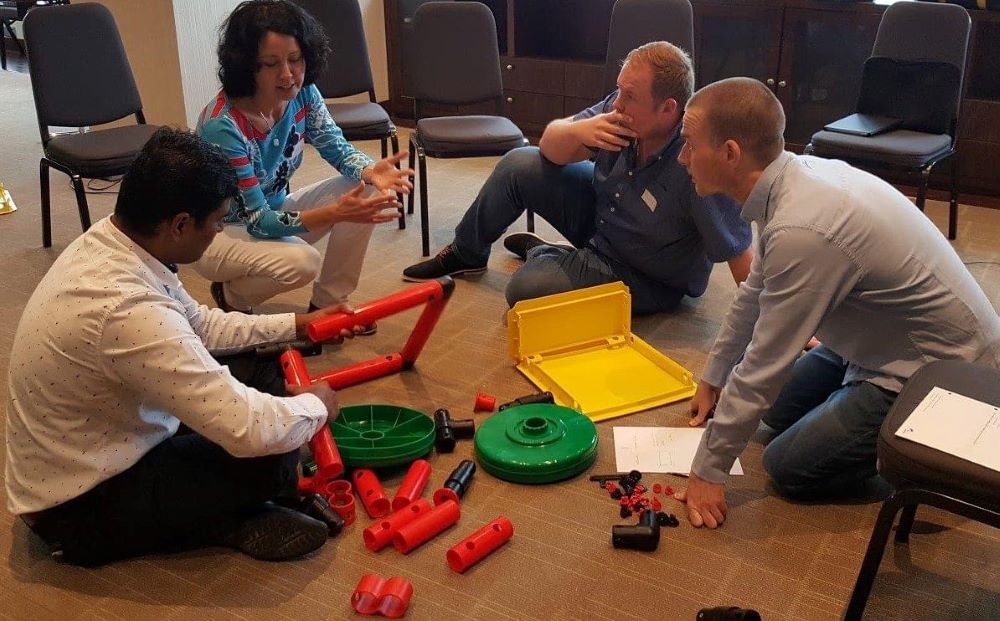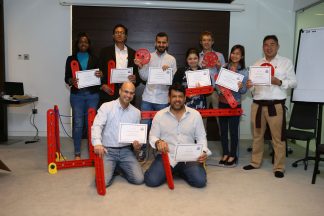Understand What Makes Customers Tick with MTa’s Experiential Training
Customer service is about much more than just the interactions an organisation has with its customers; it’s more an ethos that puts the customer first in anything the organisation and its people do. But to do that effectively, everyone in the organisation needs to understand customer needs and what makes a difference to the customer.
Good customer service is about understanding customer needs, solving problems, and offering solutions. It’s also about ensuring that the customer feels understood, and valued, and that in their various touchpoints with the organisation, they are met with empathy and sincerity.
But training your staff to deliver excellent customer service can be a tall order. You can set high standards and train on best practice, but nobody expects the unexpected. How do you ensure that staff have the right skills and approaches to deal with complex and unexpected situations? Everyone can learn by doing, but can you risk losing customers while your people learn how to get it right?
Customer service training activities from MTa help your staff really understand the impact of their behaviour and responses by putting them in complex scenarios that replicate the challenges they face day-to-day when interacting with customers. Participating in these hands-on activities, participants ‘feel’ and ‘see’ the impact of their behaviour, both positive and negative, on colleagues and customers, leading them to improve their customer service skills.
We’ll introduce some of the most relevant customer service activities below. But if you’re not sure where to start, it might be easier to give us a call or chat to us and we’ll help you find the right training activities for you, or read on for an idea of what’s available.
Walk in your customer’s shoes
Many MTa activities are specifically designed to explore customer needs. The MTa Team Kit is a good place to start, with six complex activities and 10 shorter ones that develop team working but often with a strong customer focus.
Over the Bridge is one: here participants work in teams to tight deadlines and to a vague brief, but to satisfy quite precise customer requirements. Clarifying and Commissioning are major parts of the activity: ensuring goals are clear and the team has a clear commission about what it needs to deliver to the customer.

It reflects the real world challenges of striving for customer excellence: participants with unclear information need to accurately understand what the customer is looking for and then work together to align with the customer. To be successful, they must understand what the customer is trying to do.
The MTa Insights kit offers 53 activities, many of which have a strong customer focus, exploring areas like problem-solving, effective communication, prioritisation and the ability to summarise, empathise and articulate complex ideas.
Artifacts is one activity with a strong customer focus: teams are required to bid for a contract by presenting samples of an usual product using materials defined by a customer. Interaction with the customer is strictly limited in time, can only take place at the start of the activity and is restricted to one team representative Participants need to maximise the use of that time to fully understand customer requirements. Learning opportunities include creative thinking, customer intelligence, business acumen and sales pitches.
Finally, MTa’s KanDo Lean activities all have a deep customer focus. These explore the ethos of Lean Processing from the perspective of maximising customer value. In these activities, participants need to constantly question and evaluate what is important to the customer and look to eliminate unnecessary activity that does not add customer value. The overarching aim is precision delivery of products and services that match customer needs.

All these activities are hands-on, but they are anchored on trusted behavioural theories and the principles of customer satisfaction theory. This is a way of measuring customer expectations. By understanding and acting on customer expectations, companies and other organisations are able to dramatically boost customer loyalty.
Customer expectations are all about the belief and confidence that a certain product or service will give them certain benefits, values or performance levels based on previous experience. This will be influenced by factors like the value of the product/service, overall like/dislike and whether expectations are fulfilled: real performance compared with expected performance.
Customer satisfaction is also influenced by frequency of use: for example a gym membership that is never used or additional fringe benefits the customer isn’t using. By contrast, think of how an online streaming service recommends new content to encourage customers to use it. By understanding customer preferences, and providing regular suggestions, it creates more engagement.
By focusing on understanding the customer, MTa customer service training activities allow you to get closer to the customer, meet expectations and tailor their experience:
Reflect on your reality
Each activity involves an engaging task and a thought provoking review process. This helps participants reflect on what happened in the activities, and to consider the skills, behaviours and attitudes that are necessary to succeed. In a well-facilitated exercise, it is this reflection that provides most of the learning. MTa call this the ‘Learning Arena’ where all participants are encouraged to:
- Identify the positive, indifferent and negative aspects of the activity being reviewed
- Build on positive aspects to make them even more valuable
- Develop ideas to address indifferent and negative aspects
- Evaluate and select ideas to be implemented
- Explore, practise and refine ideas
- Plan the Learning Transfer: how will the learning experience lead to tangible improvements in day-to-day performance
Participants are encouraged to reflect and think for themselves and then share their perspectives with the group. To help that reflection, each leadership activity comes with learning review sheets that should be completed before group discussion.
One of the best ways to see these kits in action and to find out which kit(s) are best for you, is to attend one of MTa’s Facilitator Masterclasses. Here you’ll get unique insights from our experienced facilitators on how to run successful sessions, as well as first-hand experience of the kits and your own reflection.
Call our friendly team today to find out more, or view the full range of MTa’s learning, development and assessment activities at https://www.experientiallearning.org/training-activities/

